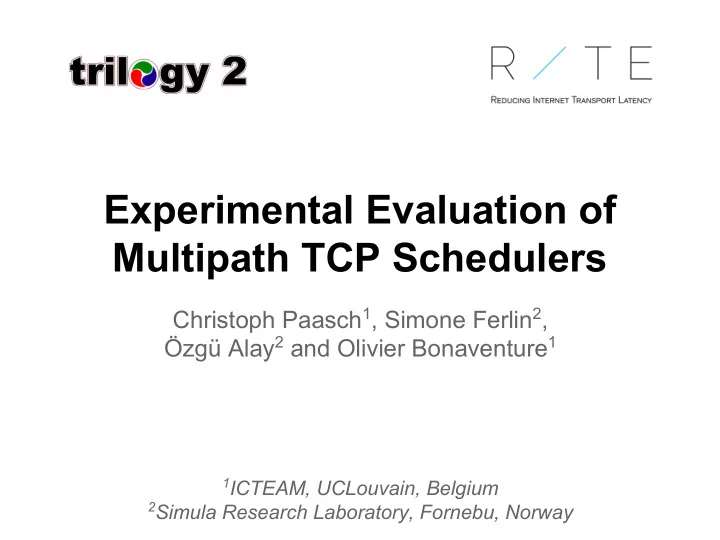

Experimental Evaluation of Multipath TCP Schedulers Christoph Paasch 1 , Simone Ferlin 2 , Özgü Alay 2 and Olivier Bonaventure 1 1 ICTEAM, UCLouvain, Belgium 2 Simula Research Laboratory, Fornebu, Norway
Multipath TCP Resource pooling Increased resilience to failures
Multipath TCP - Example
Multipath TCP - Example
Multipath TCP Scheduler
What opportunities lie in Multipath TCP Schedulers? ● What does it influence ? ● How to implement it? ● How to evaluate it?
What does the scheduler influences?
Head-of-Line Blocking 4 3 2 Low Delay (20ms) Internet 1 High Delay (150ms) ● Session blocked due to #1 ● High application-level delay ● Burstiness
Receive-window limitations window = 4 ofo-queue 4 3 2 Low Delay (20ms) 7 6 5 Internet 1 High Delay (150ms) ● Unused capacity on low-delay path ● Overall, reduced goodput
A pluggable scheduler framework
Pluggable Scheduler Framework ● Scheduling was a static decision ● Pluggable Scheduler Framework ■ Per MPTCP-session ■ loadable modules while (subflow = MPTCP-> sched-> get_subflow()) != NULL do while (data = MPTCP-> sched-> get_data(subflow)) != NULL do send_data(subflow, data); user@home:~$ sysctl -w net.mptcp.mptcp_scheduler=’roundrobin’
Pluggable Scheduler Framework ● Round-robin scheduler (RR) 4 2 Low Delay (20ms) Internet 3 1 High Delay (150ms)
Pluggable Scheduler Framework ● Round-robin scheduler (RR) ● Lowest-Delay-First (LowRTT) 2 1 3 Low Delay (20ms) Internet 4 High Delay (150ms)
Pluggable Scheduler Framework ● Round-robin scheduler (RR) ● Lowest-Delay-First (LowRTT) Extensions: Retransmission and Penalization (RP) Bufferbloat mitigation (BM)
Pluggable Scheduler Framework Extensions: Retransmission and Penalization (RP) window = 4 ofo-queue 4 3 2 Low Delay (20ms) 7 6 5 Internet 1 High Delay (150ms)
Pluggable Scheduler Framework Extensions: Bufferbloat mitigation (BM) Low Delay (20ms) Internet 7 6 5 4 3 2 1 High Delay (150ms)
Evaluating Schedulers
Resource Pooling 47 Mbps, RTT=250ms 1 Mbps, RTT=250ms LowRTT : 11 Mbps LowRTT + RP : 46 Mbps
Resource Pooling - normalization 47 Mbps, RTT=250ms 1 Mbps, RTT=250ms Same as Perfect best path aggregation 0 Mb/s -1 0 1 “Multipath Aggregation of Heterogeneous Access Networks” . D. Kaspar. Phd Thesis. University of Oslo. 2011.
Mininet evaluation Capacity, RTT, Buffering Capacity, RTT, Buffering Low-BDP High-BDP Capacity 0.1 to 100 Mbps 0.1 to 100 Mbps RTT 0 to 50 ms 0 to 400 ms Buffering 0 to 100 ms 0 to 2000 ms
Mininet evaluation Emulated environment ~400 experiments “Experimental Design” -approach “On the Benefits of Applying Experimental Design to improve Multipath TCP” . C. Paasch, R. Khalili and O. Bonaventure. CoNEXT 2013.
Mininet evaluation
Measuring application-delay ● Custom application, sending at constant rate ● Blocks of 8KB ● Measuring application-delay 2 1 3 Low Delay (20ms) Internet 4 High Delay (150ms)
Measuring application-delay TS: 50 1 Low Delay TS: 100 Diff: 50 TS: 60 2 High Delay TS: 120 Diff: 60 Delay-Variance: 60 - 50 = 10ms
NorNet testbed
Application-limited flows (500Kbps)
Conclusion
Conclusion ● Scheduling adds a new dimension with new problems and opportunities ● Pluggable scheduler for easy switching ● No “perfect” scheduler (yet)
Recommend
More recommend